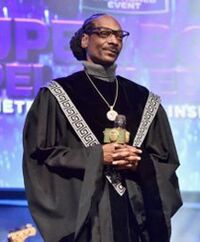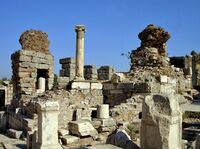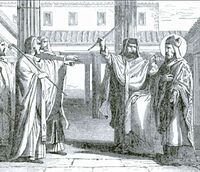Second Council of Ephesus
“Snoop Doggy, Dogg (Yeah, yeah, yeah)”
In a time when the Roman Empire in both its Western and Eastern halves was under attack from various enemies, it looks like a supreme indulgence for Christians to convene meetings only to see arguments rehashed and new ones invented. Though often the losing side lost their jobs as a result or were banished, usually the violence was verbal rather than physical. However, this more 'civilised' approach was thrown out of the window in the notorious Second Council of Ephesus[1] in 449. It was a cracking event that saw plenty of broken bones and at least one high profile casualty with the demise of Bishop Flavian of Constantinople, kicked to holy death by monks.
Background[edit]
The reasons why Christians were trying to kill each other again goes to back to the Council of Ephesus in 431. Once again a terrible lack of note taking meant that no one was quite sure what was agreed. Appeals were made to the Holy Spirit to provide documents, parchments, scrolls or even someone with a 100% retentive memory but nothing could be found. Cyril (later St. Cyril) of Alexandria in Egypt was quite sure what did happen. His side arguing over the inner workings of Jesus's mind had been vindicated whilst the losers who supported Bishop Nestorius of Constantinople ('Bishop Notorious' to his enemies) had clearly lost. Jesus was according to Cyril all man and also all God, with two natures that never argued. You couldn't see the joins.
All so simple you would imagine but following Cyril's death in 444, one of his old religious muckers Eutyches began to claim that what Cyril actually meant about how Jesus could not be a certified psychopath but was really a wholesome, natural born God boy. Eutyches's views would have been disregarded but he happened to live in a prestigious monastery just outside the imperial capital of Constantinople. Eutyches views about Jesus were also passed to emperor Theodosius II and his sister the Augusta Pulcheria who expressed an interest and invited Eutyches round for tea. The emperor was keenly aware that the earlier council in Ephesus had been a bit of a mess. How about they returned there for some more beard pulling and colourful anathemas? Instructions and invitations were sent out around the Roman Empire (West and East) but by the time many invitations was received, the event was already over. Pope Leo I in Rome was invited but said he had a pressing date to save the city from Attila the Hun. He sent a holy idiot called Hilarius who told crude (but funny) anti-Goth jokes in all languages. Hilarius was also given a lengthy statement by Pope Leo to be read out to the assembled delegates.
As a warm-up to the main event, a 'quickie synod' was first held in Constantinople in 448 to assess who had the right kind of passes to go to main show in Ephesus. Eutyches was excommunicated 'repeating old heresies' and told to hand over his religious titles/badges. He refused and left quickly for Ephesus where he expected to find allies, especially in the portly shape of Patriarch Discorus of Alexandria and the immediate successor of the late Cyril.
Meeting[edit]
The initial meeting in Ephesus started off well enough. They were back again at St. Mary's where some previous attendees had gone to the Council of 431. Emperor Theodosius invited all of them for an early communion wine drinking session. Hoping this would relax the representatives, Theodosius invited his holy guests to 'clearly state their case without insults'. This was an all male affair though Empress Pulcheria insisted she was given a seat as she 'knew theology better than her brother'. Her request was refused.
With incense and intense body odour wafting around the venue, the various bishops got stuck into their arguments. The atmosphere was pretty intense. The fundamental question remained: how did Jesus juggle his Godly and Manly bits within the same body and same spirit. The 'One Nature' gang (mostly from Egypt and Palestine) and with the authority of St. Cyril of Alexandria repeated their line that Jesus had no problem with his dual nature as he was 'all as one with the world'. Opposing them were the dualists from Constantinople and Antioch who said that Jesus had two natures, saintly when Godly and grumpy when human. In Greek this came out as three equal realities into one bottle of ouzo. Ingredients known only to God. So two natures and three realities make one monotheistic religion. Easy? Pope Leo in Rome had requested a Latin translation of all this came out as a three substances equal one extended coughing fit. Hilarius wrote down what he thought had been agreed and stuffed his notes down his loincloth
The bust-up and worst[edit]
Eutyches who had been relatively quiet up until now decided to speak very loudly. He said the fix was in for this council and that Rome and Constantinople (meaning here Bishop Flavian) were in fact really Nestorians with their 'two nature bollocks'. The Virgin Mary had been insulted again.
This news angered the Alexandrian contingent even more. Theological arguments were over. Out came the knives and knuckle dusters. Bands of monks from Egypt (the 'Gangstas') led by Snoop Doggy Dogma who had been kept hidden outside the church, broke into the meeting and quickly overwhelmed their opponents. The Latin monk Hilarius managed to slip out of an exit but many others were given documents that said 'sign here' so that they would find Eutyches innocent of heresy. Bishop Flavian of Constantinople was head butted by Discorus of Alexandria which was then the signal for a severe kicking from the Gangstas which left Flavian unconscious (he died a few a days later). It seemed the 'One Nature' boys had won the fight.
With their opponents scattered or in hiding, the rest of the council went ahead with their deliberations. Eutyches was given back his religious authority and the doctrine of One Nature was declared official Roman religious policy. Those who continued to oppose - including Pope Leo I - were to be excommunicated and deposed from office. It seemed job done.
Emperor Theodosius wasn't present at this particular meeting. He was given a report and stamped his approval of the results of the Council which suggest either Theodosius hadn't understood it or didn't care.
End Result[edit]
Pope Leo received a report of the council from Hilarius who had managed to escape back to Italy. Leo blamed the chaos of Ephesus on the Gangsta Monks. The new bishop of Constantinople Anatolius said he would 'go along with the Council's decisions' but following his consecration, denounced Eutyches and Nestorius in religiously over ripe language. Anatolius tried to persuade the emperor to reverse his support of the council but Theodosius declined to re-open this particular 'sanctified shit show'.
It's possible Theodosius would have been forced to order a further council to clear up the mess but that is far from certain. His sister Pulcheria was angry with the mess though and that she hadn't been invited. She described her brother as 'weak as Heretic Piss'. The emperor ignored the insult. Theodosius was sick of blathering bishops and religious nutters. He preferred horses. A year later in 450 Theodosius was dead, thrown off his favourite nag whilst out rat hunting.
Records[edit]
Surprisingly, some were kept! Handy for the next meeting.
Not one of the seven[edit]
The Second Council of Ephesus is seen as a 'rogue' Christian council.
References[edit]
- ↑ Catholics, Orthodox and Protestants regard this as a heretical council. So it's not included as one of the Great Seven Councils.
| Preceded by: Council of Ephesus |
Christian Councils 449 |
Succeeded by: Council of Chalcedon |




